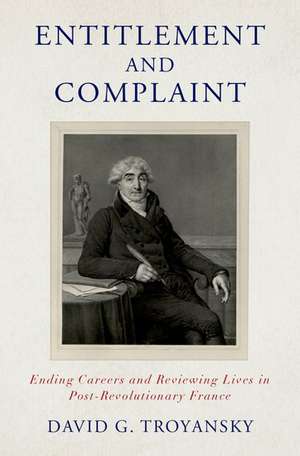Entitlement and Complaint: Ending Careers and Reviewing Lives in Post-Revolutionary France
Autor David G. Troyanskyen Limba Engleză Hardback – 19 iun 2024
Preț: 341.46 lei
Preț vechi: 468.80 lei
-27% Nou
Puncte Express: 512
Preț estimativ în valută:
65.35€ • 67.97$ • 53.95£
65.35€ • 67.97$ • 53.95£
Carte disponibilă
Livrare economică 13-19 martie
Livrare express 08-14 martie pentru 89.25 lei
Preluare comenzi: 021 569.72.76
Specificații
ISBN-13: 9780197638750
ISBN-10: 0197638759
Pagini: 256
Ilustrații: 11
Dimensiuni: 226 x 160 x 33 mm
Greutate: 0.54 kg
Editura: Oxford University Press
Colecția OUP USA
Locul publicării:New York, United States
ISBN-10: 0197638759
Pagini: 256
Ilustrații: 11
Dimensiuni: 226 x 160 x 33 mm
Greutate: 0.54 kg
Editura: Oxford University Press
Colecția OUP USA
Locul publicării:New York, United States
Recenzii
This book brilliantly combines archival research with insights from gerontological theory to explain how civil servants in post-Revolutionary France innovated a right to government-funded old-age retirement. This retiring vanguard left a surprisingly rich archive, revealing how they experienced old age. The self-definition of these men and their widows paved the way for twentieth-century concerns about old-age pensions, generational conflict, distributive justice, and the importance of life review. This is a beautiful book that realizes the full potential of crossing disciplinary boundaries between history and gerontology.
How did old-age pensions go from a form of charity to a legally recognized right? David Troyansky uses a remarkable collection of nineteenth-century documents to show how French magistrates argued that, even if they had served many of the country's changing regimes, they and their families deserved support when they were too old to work. Troyansky's imaginative research sheds light on issues that are still central in our own societies, with their aging populations.
David Troyansky has written a wonderfully lucid, instructive, and sensitive study that illustrates changing conceptions of the life course, of old age, and of the state's social responsibilities in a time of political turmoil. Based on rich documentation, it sheds fascinating new light on the origins of the modern welfare state. This is a book that will be of great interest to anyone working on the history of modern Europe.
How did old-age pensions go from a form of charity to a legally recognized right? David Troyansky uses a remarkable collection of nineteenth-century documents to show how French magistrates argued that, even if they had served many of the country's changing regimes, they and their families deserved support when they were too old to work. Troyansky's imaginative research sheds light on issues that are still central in our own societies, with their aging populations.
David Troyansky has written a wonderfully lucid, instructive, and sensitive study that illustrates changing conceptions of the life course, of old age, and of the state's social responsibilities in a time of political turmoil. Based on rich documentation, it sheds fascinating new light on the origins of the modern welfare state. This is a book that will be of great interest to anyone working on the history of modern Europe.
Notă biografică
David G. Troyansky is Professor of History at Brooklyn College and the Graduate Center of the City University of New York. He is the author of Old Age in the Old Regime: Image and Experience in Eighteenth-Century France and Aging in World History as well as numerous articles on the history of old age and aspects of French cultural history. He is co-editor of Transnational Spaces and Identities in the Francophone World, The French Revolution in Culture and Society, and a six-volume Cultural History of Old Age.
